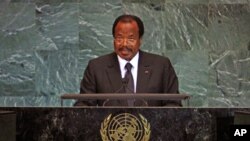Lawmakers in Cameroon have agreed to changes in the electoral law that would allow some people living outside the country to take part in October's presidential vote. Opponents of President Paul Biya have been pushing the move as part of changes they want before that vote.
Biya is running to extend the power he has held since 1982, having changed the constitution to remove term limits.
The 77-year-old is again facing a divided opposition and is backed by security forces experienced in putting down protests. Changes made in the run-up to this vote have largely favored the ruling party, including shifting the authority to announce results from the electoral commission to the constitutional council.
After years of opponents pushing to extend voting rights to an estimated 5 million Cameroonians living abroad, Biya's party has now agreed, with conditions.
National Assembly Vice President Emilia Lifaka said the new law extends only to those who are duly registered with their local embassy. It does not include Cameroonians with dual nationality or those seeking asylum.
“There are Cameroonians who have applied for asylum," said Lifaka. "You know those Cameroonians will not come up because they have already said they are looking for them in the country. The country is bad. The country is this. So those people who are asylum seekers will definitely not go and register [at the embassy]. That will not be our fault.”
Opposition lawmaker Joseph Banadzem said it is unfair to penalize many of Cameroon's best and brightest who have settled abroad.
“Our compatriots who settled out are those who went and did serious studies, who got good jobs, who even got married to foreigners," said Banadzem. "They have that double nationality. If we don't open up, those are the people who eventually will not vote. And they are the people whose vote would have a lot more meaning in Cameroon.”
Banadzem said Biya's party wants to restrict expatriate voting because most of those living abroad oppose his nearly 30 years in power.
“Those who are out there are those who are generally very critical, generally very objective, impartial and always do things which are right," said Banadzem. "And if they are opposition, it means that the opposition is doing and saying which are acceptable by most of the people around.”
Banadzem said the move to extend voting rights to some expatriates should be accompanied by other changes, including a more independent electoral commission.
“This vote of the diaspora should have meaning. Before you have Cameroonians abroad voting, you must know that the electoral process is proper," he said. "You can not have a fraudulent electoral process and then you let Cameroonians in the diaspora vote.”
Ruling party lawmaker Lifaka said that like anything new, voting abroad will be a work in progress. She said the government is willing to consider extending voting rights to those with dual nationality in the future.
“Most Cameroonians want to be part of the decision-making process in this country. And I think if we get our compatriots who are out of the country to register and vote where they are, I think it is very important. It shows how far our democracy is evolving.”
With just three months to go, Interior Minister Marafa Hamidou Yaya said he will do everything possible to ensure that the new expatriate voting rules are applied for this vote.
Some Diaspora Voters Cleared to Cast Ballots in Cameroon Election




